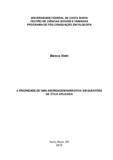| dc.creator | Stein, Mateus | |
| dc.date.accessioned | 2018-02-23T15:46:30Z | |
| dc.date.available | 2018-02-23T15:46:30Z | |
| dc.date.issued | 2016-08-12 | |
| dc.identifier.uri | http://repositorio.ufsm.br/handle/1/12528 | |
| dc.description.abstract | The present study aims to analyze the possibility of employing a narrative approach –
especially the literary – in the treatment of applied ethical issues compared to the
approaches of Normative Ethics as Utilitarian Theory. In the first chapter, we will
focus primarily on some metaethical
considerations about morality. In the second, in
the other hand, we intend to present certain characteristics of the Utilitarian doctrine.
It is worth remembering that we call traditional all approaches of Normative Ethics.
This includes the Kantian ethical theory, Virtue Ethics, besides the already mentioned
Utilitarianism. In sequence, in the third chapter, we will introduce the Ethics of
Authenticity notion as a starting point through which we will begin to conceive the
viability of a narrative approach in Ethics. Furthermore, the forth chapter of this
assessment will include remarks of own authorship on what consists a differentiated
approach in Applied Ethics. Without delay, in the fifth, we will promote an
exemplification of how Applied Ethics issues can be problematized starting from a
narrative approach. Finally, in the sixth chapter, we will show some objections to the
premise that narrative cohesion in the life of an individual is necessary and essential
for it to make some sense from a moral standpoint. In short, we will seek to indicate
in this dissertation how the criticism thrown by Carl Elliott, Raimond Gaita, Charles
Taylor (and others) to traditional notions of ethics – the Utilitarian notion of Peter
Singer, for example – are capable of causing significant changes and improvements
in areas of knowledge crucial to the most diverse interests. In a nutshell, Gaita
advocates a concept of morality at the same time more humane and less distant from
the daily reality shared by all of us. According to Elliott, in turn, the Bioethics
manuals, health professionals and researchers working in the area of Applied Ethics
can be widely benefited from the change proposed by him. In addition, we will argue,
similarly, that literature allows us to reflect more deeply on a considerable number of
issues relevant to Philosophy. | eng |
| dc.description.sponsorship | Coordenação de Aperfeiçoamento de Pessoal de Nível Superior - CAPES | por |
| dc.language | por | por |
| dc.publisher | Universidade Federal de Santa Maria | por |
| dc.rights | Attribution-NonCommercial-NoDerivatives 4.0 International | * |
| dc.rights.uri | http://creativecommons.org/licenses/by-nc-nd/4.0/ | * |
| dc.subject | Bioética | por |
| dc.subject | Ética aplicada | por |
| dc.subject | Literatura | por |
| dc.subject | Moralidade | por |
| dc.subject | Narratividade | por |
| dc.subject | Applied ethics | eng |
| dc.subject | Bioethics | eng |
| dc.subject | Literature | eng |
| dc.subject | Morality | eng |
| dc.subject | Narrativity | eng |
| dc.title | A prioridade de uma abordagem narrativa em questões de ética aplicada | por |
| dc.title.alternative | The priority of a narrative approch in applied ethics issues | eng |
| dc.type | Dissertação | por |
| dc.description.resumo | O presente trabalho tem por objetivo analisar a possibilidade de emprego de uma
abordagem narrativa – em especial a literária – no tratamento de questões de ética
aplicada frente às abordagens da ética normativa, como a teoria utilitarista. No
primeiro capítulo, focaremos primariamente em algumas considerações metaéticas
acerca da moralidade. No segundo, por sua vez, pretendemos apresentar certas
características da doutrina utilitarista. Vale a pena lembrar que chamaremos de
tradicionais todas as abordagens da ética normativa. Isso incluí a teoria deontológica
kantiana, a ética das virtudes, além do já mencionado utilitarismo. Em sequência, no
terceiro capítulo, introduziremos a noção de ética da autenticidade como ponto de
partida através do qual começaremos a conceber a viabilidade de uma abordagem
narrativa em ética. Outrossim, o quarto capítulo da presente apreciação contará com
observações de autoria própria a respeito do que consiste uma abordagem
diferenciada em ética aplicada. Sem demora, no quinto, promoveremos uma
exemplificação de como questões de ética aplicada podem ser problematizadas a
partir de uma abordagem narrativa. Finalmente, no sexto capítulo, evidenciaremos
algumas objeções à premissa de que é necessário e imprescindível haver coesão
narrativa na vida de um indivíduo para que essa faça algum sentido, a partir de um
ponto de vista moral. Em resumo, nesta dissertação buscaremos indicar como as
críticas lançadas por Carl Elliott, Raimond Gaita, Charles Taylor (e outros) à noções
tradicionais da ética – a utilitarista de Peter Singer, por exemplo – são capazes de
provocar mudanças e melhorias significativas em áreas do saber cruciais aos
interesses mais diversos. Em poucas palavras, Gaita defende uma concepção da
moralidade ao mesmo tempo mais humanizada e menos distante da realidade
cotidiana compartilhada por todos nós. De acordo com Elliott, por seu turno, os
manuais de bioética, os profissionais da saúde e os pesquisadores que trabalham
com a área de ética aplicada podem ser amplamente beneficiados com a mudança
por ele proposta. Ademais, sustentaremos, similarmente, que a literatura nos permite
refletir com maior profundidade sobre uma série de questões pertinentes à filosofia. | por |
| dc.contributor.advisor1 | Sattler, Janyne | |
| dc.contributor.advisor1Lattes | http://lattes.cnpq.br/9316851338632064 | por |
| dc.contributor.referee1 | Dall'Agnol, Darlei | |
| dc.contributor.referee1Lattes | http://lattes.cnpq.br/1009956459333986 | por |
| dc.contributor.referee2 | Rossato, Noeli Dutra | |
| dc.contributor.referee2Lattes | http://lattes.cnpq.br/2947312243186882 | por |
| dc.creator.Lattes | http://lattes.cnpq.br/9921012374463425 | por |
| dc.publisher.country | Brasil | por |
| dc.publisher.department | Filosofia | por |
| dc.publisher.initials | UFSM | por |
| dc.publisher.program | Programa de Pós-Graduação em Filosofia | por |
| dc.subject.cnpq | CNPQ::CIENCIAS HUMANAS::FILOSOFIA | por |
| dc.publisher.unidade | Centro de Ciências Sociais e Humanas | por |



